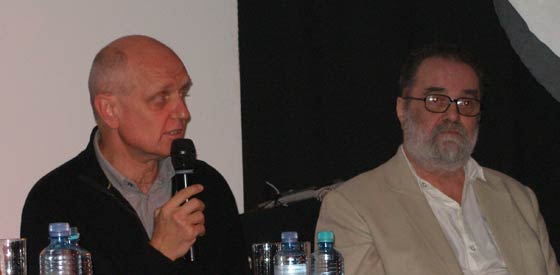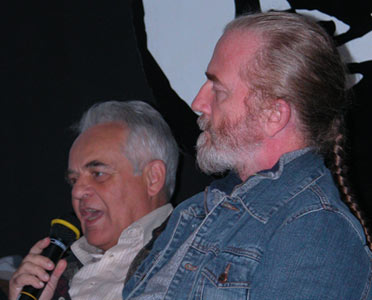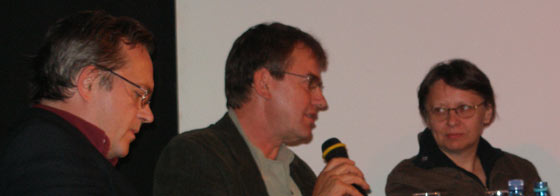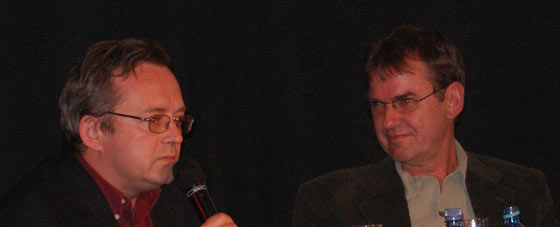Full (Hungarian) text and audio of the sympozium (1)
Symposium (1) in brief
[Péter György] We will be discussing the future of an institution the closing down of which I think will practically mean that the research of a tradition which is crucial to the understanding of modern-day Hungary will be made first very difficult in today’s Hungarian society and eventually it will become virtually impossible. [...]
The fact alone that something belongs to contemporary culture does not mean that it should not be integrated so much into – sorry for the term – the memory of the nation, because in this context the concept of national culture is part of a discourse and not of something finalised. But let’s just say that if the accomplishments of contemporary culture are not preserved, i.e. if they are omitted from the chain of institutional systems that generally speaking keep the documents of collective memory or cultural memory, then, a crime is committed, in the most literal sense of the word, against that particular cultural tradition that is integral to Hungary’s cultural mementos… cultural norms and cultural tradition regardless of whether the decision-makers in question personally like it or not. [...]

[P.Gy.] In Artpool’s case we have a unique situation: they built up an archiving system which is as important as the material the collecting of which it was built for. It is a very rare practice in the museum world [...] because it cannot simply be switched off since the whole system will stop existing. Sapienti sat. Those who think that Artpool’s archiving system can conveniently be deleted from Hungarian scientific institutions make a double mistake in practical terms, at least I think so [...]
It can also be included among the achievements of the Hungarian Avant-garde – and let’s put aside issues like the Party Headquarters, the political circumstances, etc., historical reality for now – that its members take it seriously. And so it is a problem of cultural anthropology. One of the problems the Kádár regime had with the opposition is that it took what it believed in seriously. It horribly upset the society whose leaders did not believe in one thing alone: what they were actually recruited to do. [...]

[Gyula Pauer] When around the time of the change in the political system the opportunity, theoretically, arose to think and do things again as we wished, enabling us to re-establish a non-manipulated relationship between ourselves and reality by following our own inclinations and creative drives, I am actually not only talking about an issue in the past – since we are not veterans remembering the deeds we did in the 1970s – but a problem that is very much here with us in the present. It is an incredibly important problem in the present because people’s thinking is beginning to get rusty and it is so much more convenient to only make the audiences – who, forgive me for saying this is ignorant to a large part – accept the brand new things, which have emerged for the first time. In other words, historical continuity is not possible [...]
[Gy.P.] We could keep on talking about this endlessly, but overall it is pretty obvious that none of us wants this archive to stop operating, since there is still a chance [...]
and I think the state and everyone else, the whole of society, is obliged to ensure the continued recording and archiving of fresh achievements. [...]
[Gy.P.] If we can talk about hard and soft dictatorship, then, in practical terms, what we have now is soft democracy. I mean, I still don’t feel and do not want to believe that all this should or will stop, or that it might already have stopped. And even if it does stop, we will need to go back to those times when we took the initiative in our hands. [...]
[Péter György] I am saying this in earnest: perhaps the time of being naughty has come, and this should not only mean that the band called Lopunk [meaning: We Steal] will have an organised performance at 10 p.m, It should also mean that for example we will think of some lawful solution which will make it uncomfortable for decision-makers not to give a certain amount of money. I think that politicians these days only give money for one reason only: if they are forced to realise that not giving costs them more than giving. There is no other reason that makes them give.
[Judit Geskó] I am quite certain that you can only achieve things if you know the right people, and it will be no different in the case of Artpool either. If a dozen or two dozen people can somehow persuade the town hall, the cultural governance and the potential sponsors to support Artpool, then it will happen; if not, it won’t. We don’t have the same opportunity, actually, we have less now than fifteen, sixteen and seventeen years ago, because now we no longer have the backing or coercive force that we had in the past, we no longer have the circumstances which we could convert into a kind of moral capital.

[Géza Perneczky] The biggest mistake we can make is to envision Artpool and the Hungarian Avant-garde as something radically different from Western European, American, Australian, Canadian and other arts. It is not. We can see that it is exactly the same if we view it from a distance, if we look back at it from a bigger distance in time, and if we look at the actual, concrete works we will be amazed at how similar our art is to theirs. [...]
I think this similarity is the most shocking aspect here. The fact that the further back we go in time and space, the more it seems that Artpool has the same role in an international context than other large archives, some of which already form part of public collections, especially in the USA. [...]
To sum up, I see Artpool’s significance in that it is part of a chain that in my opinion only ten to twelve similar archives belong to worldwide. [...] And I must say that I know of no other collection as prominent as Artpool to the East of Western Europe, to the east of the Rhine. [...] We are talking about the future of a unique collection, at least completely unique in this region. And what we have at stake here is, and I think Gábor Klaniczay has already said this, that we either scrap or dump it, or we save it. [...]
[G.P.] If in the case of Moholy-Nagy – who is the greatest, most recognised artist of Hungarian origin, in the world, even more than Vasarely and Munkácsy and almost of equal rank with Béla Bartók – decision-makers in Hungary have been saying for decades now that they want no part of it, that there is no room for him, they cannot afford it, cannot pay the insurance, the cleaning lady, the security, the electricity the lighting and so on… then we really are facing a darn difficult situation when it comes to saving Artpool’s collection, which is not valued at the same level as Moholy-Nagy despite being just as important. [...]
[Endre Szkárosi] It has been a long-standing contention of mine that memory is not aimed back at the past but ahead into the future. And since it is aimed at the future, we should first come to terms with the past. We have done it to a certain extent, and some of it is going on now. We seem to place more emphasis on the 1970s and1980s, and we don’t want to be seen as being nostalgic and that this whole Artpool issue belongs to the past. During the press release it was already said that artistic initiatives are still being taken, and Artpool welcomes these, they are developing their website, so the institution is an active part of the international arena not only as an archive but also as an art research centre, and it functions as a, how shall I put it, as a centre for keeping art alive. [...]

[Gábor Klaniczay] I personally saw Artpool as an exciting and important undertaking – besides the fact that it documents Avant-garde art, and within that branches ranging from Mail Art to all kinds of ephemeral manifestations of art that are underrepresented elsewhere – because it documents something that was labelled as banned art in the 1970s and 1980s, and although such historical memory is hugely important, it was very difficult at least for the users and the participants to document it. [...]
But let me add something else: what we are talking about is not only art but something more complex and thus more interesting and valuable from a historian’s point of view. From its inception, Artpool – driven by the concept of art, a rightful and very important concept – was present at a lot of venues where events not only related to art but also to other aspects of the underground subculture or milieu took place. At these events art, performance, entertainment, politics and all sorts of things that constitute culture were melded together – things that were extremely important in the second half of the 20th century and were very important in our lives. It was actually a kind of mould in which all these things were mixed together. And let me stress that these things are fused together, they are in the same context, and it might make Artpool different from the so-called real, proper archives, where things are collected according to strict categories, but that is exactly what makes it interesting. [...]
I think Artpool is interesting in an international context too. And generally speaking it is something that I think people everywhere are more or less discovering and recognising these days. [...] So to end Artpool at a time like this is pure madness but that is how things often tend to happen: that we throw something out in the moment or one or two hours before it that it would start gaining momentum, and I believe it is the same story here all over again, or at least it seems imminent and so we should do our best to prevent it from happening. [...]
[K.G.] It is history that is still going on, and its essence is – as opposed to or independently of prevailing art history archiving structures in museums – that it is created through a kind of self-organising process, something that is manifest in civil societies, and this value should be preserved in the form it is in now. [...]
[Judit Geskó] I also regard protecting the autonomous nature of Artpool – which Gábor just talked about – as really valuable. If the founders were to be excluded from it, it would be highly problematic. I think that the winds of change are also blowing in one-hundred-year-old institutions too, but there are entirely different drivers in action there. These two different types of institutions should be somehow allowed to function together and an operational framework should be developed to ensure it. [...]

[Ferenc Hammer] What we should not forget is that it was an integral part of life in those days to slip out of the established system of Banned, Tolerated and Supported. But what today’s twenty-year-olds imagine this meant, that back then the Avant-garde… So as much as I know – remember, I attended primary school in those days, now I am forty-two – so, as much as I remember and what I know about it, the objective of the Avant-garde was not to start throwing cobblestones and bring the events of 1956 back; their attack was not aimed at the Party Headquarters but rather to have a normal life, or at least that’s how I see it. And the policy of normality, if I can use this term, was very closely linked to people’s way of life.
Now, the question is: what picture do today’s twenty-year-olds have of those days? Well, mostly they do not have a clue. [...]
[Péter Fuchs] When I was coming to this symposium, I met a few young people at the top of the lift; they... I don’t know if it’s appropriate or not to tell you but they are about to do an Avant-garde action, I mean if house occupation can be considered an Avant-garde act. I know these young people as I teach them lectures about fine art and I am trying to bring close to them the art and the art movements that were active in the 1960, 1970 and 1980s. I am trying to somehow bring closer together these two like-minded communities. So I tried to bring them to this event and explain a bit about this exhibition. They came in and said it was boring for them, and left. I do believe that the Artpool archive is really important, indeed I would say it is in the top ten in the world, and I use it a lot, I research it and I can use its web pages for many things too – including the lectures I referred to – but I don’t see how Artpool could reach out to this young audience. Besides Artpool functioning as an archive, I believe the other main mission Artpool should have is to show these young people who are involved in an Avant-garde cultural flow that you were in back then – what that this art is all about – if it is art, or if not then it is something crucially important to us. That’s what I would press, that’s the direction I would pursue. [...]